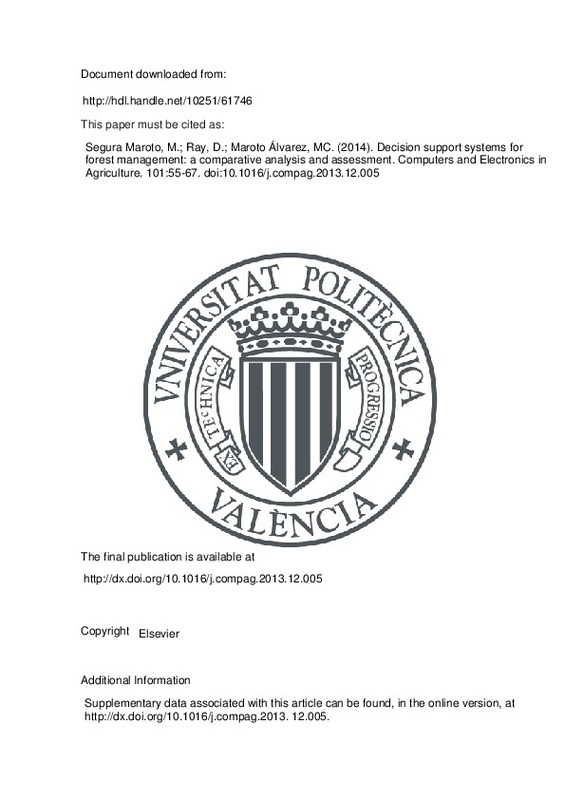JavaScript is disabled for your browser. Some features of this site may not work without it.
Buscar en RiuNet
Listar
Mi cuenta
Estadísticas
Ayuda RiuNet
Admin. UPV
Decision support systems for forest management: a comparative analysis and assessment
Mostrar el registro sencillo del ítem
Ficheros en el ítem
| dc.contributor.author | Segura Maroto, Marina
|
es_ES |
| dc.contributor.author | Ray, Duncan
|
es_ES |
| dc.contributor.author | Maroto Álvarez, Mª Concepción
|
es_ES |
| dc.date.accessioned | 2016-03-11T14:30:00Z | |
| dc.date.available | 2016-03-11T14:30:00Z | |
| dc.date.issued | 2014-02 | |
| dc.identifier.issn | 0168-1699 | |
| dc.identifier.uri | http://hdl.handle.net/10251/61746 | |
| dc.description | Supplementary data associated with this article can be found, in the online version, at http://dx.doi.org/10.1016/j.compag.2013. 12.005. | es_ES |
| dc.description.abstract | [EN] Decision Support Systems (DSS) are essential tools for forest management practitioners to help take account of the many environmental, economic, administrative, legal and social aspects in forest management. The most appropriate techniques to solve a particular instance usually depend on the characteristics of the decision problem. Thus, the objective of this article is to evaluate the models and methods that have been used in developing DSS for forest management, taking into account all important features to categorize the forest problems. It is interesting to know the appropriate methods to answer specific problems, as well as the strengths and drawbacks of each method. We have also pointed out new approaches to deal with the newest trends and issues. The problem nature has been related to the temporal scale, spatial context, spatial scale, number of objectives and decision makers or stakeholders and goods and services involved. Some of these problem dimensions are inter-related, and we also found a significant relationship between various methods and problem dimensions, all of which have been analysed using contingency tables. The results showed that 63% of forest DSS use simulation modelling methods and these are particularly related to the spatial context and spatial scale and the number of people involved in taking a decision. The analysis showed how closely Multiple Criteria Decision Making (MCDM) is linked to problem types involving the consideration of the number of objectives, also with the goods and services. On the other hand, there was no significant relationship between optimization and statistical methods and problem dimensions, although they have been applied to approximately 60% and 16% of problems solved by DSS for forest management, respectively. Metaheuristics and spatial statistical methods are promising new approaches to deal with certain problem formulations and data sources. Nine out of ten DSS used an associated information system (Database and/or Geographic Information System - GIS), but the availability and quality of data continue to be an important constraining issue, and one that could cause considerable difficulty in implementing DSS in practice. Finally, the majority of DSS do not include environmental and social values and focus largely on market economic values. The results suggest a strong need to improve the capabilities of DSS in this regard, developing and applying MCDM models and incorporating them in the design of DSS for forest management in coming years. | es_ES |
| dc.description.sponsorship | The authors acknowledge the support received from European Cooperation in Science and Technology (COST Action FP0804 - Forest Management Decision Support Systems "FORSYS"), the Ministry of Economy and Competitiveness through the research project Multiple Criteria and Group Decision Making integrated into Sustainable Management, Ref. ECO2011-27369 and Ministry of Education (Training Plan of University Teaching). We also thank the editor and reviewers for their suggestions to improve the paper. | |
| dc.language | Inglés | es_ES |
| dc.publisher | Elsevier | es_ES |
| dc.relation.ispartof | Computers and Electronics in Agriculture | es_ES |
| dc.rights | Reconocimiento - No comercial - Sin obra derivada (by-nc-nd) | es_ES |
| dc.subject | Decision support systems | es_ES |
| dc.subject | Forest management | es_ES |
| dc.subject | Multiple criteria decision making | es_ES |
| dc.subject | Group decision making | es_ES |
| dc.subject | Optimization | es_ES |
| dc.subject | Simulation | es_ES |
| dc.subject.classification | ESTADISTICA E INVESTIGACION OPERATIVA | es_ES |
| dc.title | Decision support systems for forest management: a comparative analysis and assessment | es_ES |
| dc.type | Artículo | es_ES |
| dc.identifier.doi | 10.1016/j.compag.2013.12.005 | |
| dc.relation.projectID | info:eu-repo/grantAgreement/COST//FP0804/EU/Forest Management Decision Support Systems (FORSYS)/ | es_ES |
| dc.relation.projectID | info:eu-repo/grantAgreement/MICINN//ECO2011-27369/ES/TECNICAS MULTICRITERIO Y TOMA DE DECISIONES PARTICIPATIVA PARA UNA GESTION SOSTENIBLE/ | es_ES |
| dc.rights.accessRights | Abierto | es_ES |
| dc.contributor.affiliation | Universitat Politècnica de València. Departamento de Estadística e Investigación Operativa Aplicadas y Calidad - Departament d'Estadística i Investigació Operativa Aplicades i Qualitat | es_ES |
| dc.description.bibliographicCitation | Segura Maroto, M.; Ray, D.; Maroto Álvarez, MC. (2014). Decision support systems for forest management: a comparative analysis and assessment. Computers and Electronics in Agriculture. 101:55-67. https://doi.org/10.1016/j.compag.2013.12.005 | es_ES |
| dc.description.accrualMethod | S | es_ES |
| dc.relation.publisherversion | http://dx.doi.org/10.1016/j.compag.2013.12.005 | es_ES |
| dc.description.upvformatpinicio | 55 | es_ES |
| dc.description.upvformatpfin | 67 | es_ES |
| dc.type.version | info:eu-repo/semantics/publishedVersion | es_ES |
| dc.description.volume | 101 | es_ES |
| dc.relation.senia | 262643 | es_ES |
| dc.contributor.funder | European Commission | |
| dc.contributor.funder | European Cooperation in Science and Technology | es_ES |
| dc.contributor.funder | Ministerio de Ciencia e Innovación | es_ES |







![[Cerrado]](/themes/UPV/images/candado.png)

